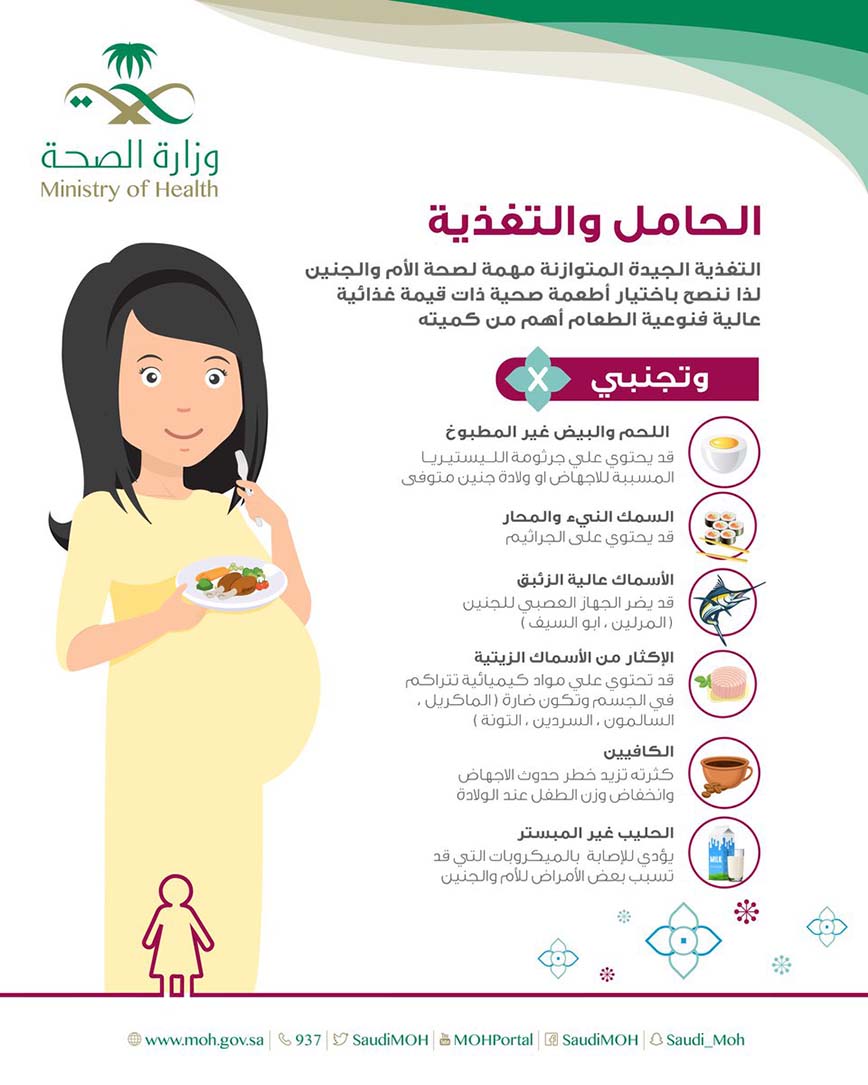 Through an Infographic published in its twitter page, within its awareness campaign "#Healthy Pregnancy", MOH advised pregnant women to take pre-pregnancy vaccines, to eat iron-rich foods to avoid anemia, to take folic acid pills when planning to get pregnant until the 12th week, as well as consulting your doctor before taking any medicines or supplements. It also advised them to avoid eating uncooked meat and eggs that may harbor listeria because the bacterium is known to cause miscarriage and stillbirth, indicating that the baby normal weight gain during pregnancy is between 3 and 5.3kg and the total pregnancy weight between 10 – 12.5kg.
Through an Infographic published in its twitter page, within its awareness campaign "#Healthy Pregnancy", MOH advised pregnant women to take pre-pregnancy vaccines, to eat iron-rich foods to avoid anemia, to take folic acid pills when planning to get pregnant until the 12th week, as well as consulting your doctor before taking any medicines or supplements. It also advised them to avoid eating uncooked meat and eggs that may harbor listeria because the bacterium is known to cause miscarriage and stillbirth, indicating that the baby normal weight gain during pregnancy is between 3 and 5.3kg and the total pregnancy weight between 10 – 12.5kg.
It pointed out that you can begin an exercise program after consulting with the doctor to help adapt with the physical and mental changes and be prepared for delivery and to contribute to prevent back pain and constipation, noting that the best sports for pregnancy is walking, swimming and yoga.
According to MOH, the ideal sleeping position during pregnancy is on one of your sides, supporting your abdomen with a pillow, putting a pillow between your knees, taking a siesta, reducing tea, coffee and soft drink intake before sleeping, avoiding sleeping on your back, which can cause a decrease in circulation to your baby.
MOH confirmed that a narrow pelvis has nothing to do with having a successful vaginal birth. In this regard caesarean section is an emergency not an option, however it might be necessary due to some uterine malformation, baby's position and weight, placenta praevia, baby suffocation, carrying more than one baby and some premature birth cases. The C-section is decided when the baby cannot come out during vaginal birth in spite of medical interventions.
It said that here's no single cause of postpartum depression, but likely results from a combination of physical and emotional factors including changes in female hormones, changes in thyroid hormones, poor sleep, and stress. The main risk factors for postpartum are having a personal and family history of mental diseases, anxiety and stress.